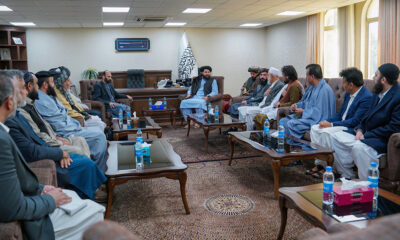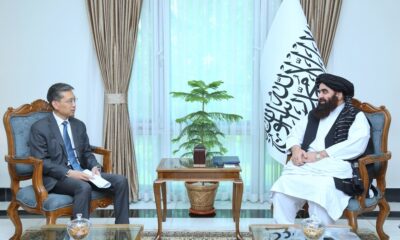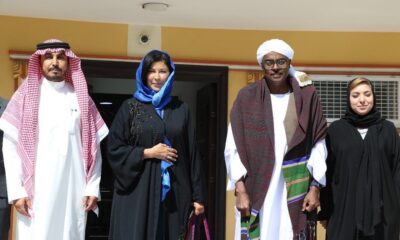Latest News
Moscow calls for ‘comprehensive solution’ to Afghan economic problem

Hosting representatives of several regional countries for talks on Afghanistan, Moscow on Wednesday called for a “comprehensive solution” to the economic crisis in the country.
“We have to provide a comprehensive solution to the Afghan economic issue. In our opinion, the main responsibility for this rests with the collective West, those who drove the country for 20 years to the current deplorable state as well as shamelessly continue economically suffocating the country by holding the frozen national assets of Afghanistan,” Zamir Kabulov, Russia’s special representative for Afghanistan, said at the Moscow format meeting.
“The steps proposed by the West to alleviate the situation such as establishing the trust fund or printing banknotes are for demonstration purposes only. They seek first to get rid of responsibility, and on the other hand to maintain control leverages on the emerging governance system in the country. We again urge the United States and their allies to unconditionally unlock national financial assets of Afghanistan,” Kabulov said.
Kabulov said that Russia, in bilateral interaction, with the current authorities in Afghanistan, attaches priority to the development of political, economic ties and contributing to the intra-Afghan settlement.
China’s envoy said that the past year was a year of failures for the United States.
“For the United States, the past year has been a year of repeated failures and yet more evil actions. The current movement symbolizes the complete failure of the US strategy on Afghanistan, the complete failure of Western democracy on a country and the complete failure of hegemonism. Instead of taking primary responsibility in Afghanistan’s reconstruction, the United States, in turn, shamelessly seized the $7 billion assets of Afghan central bank, and suspended all the development aid,” China’s special envoy for Afghanistan, Yue Xiaoyong, said.
Hassan Kazemi Qomi, Iran’s special representative, said that Iran opposes the return of US to Afghanistan, adding regional countries should play their role in addressing the current situation in Afghanistan.
He also called for the formation of an inclusive government in Afghanistan.
Pakistan’s envoy said that “the interim government of Afghanistan has not made the kind of progress that the international community would ideally expect.”
“The international community has consistently urged the interim Afghan government to promote greater political inclusivity. Unfortunately, there is little to show on this count. Despite assurances by the Afghan interim government, the rights of women and girls also appear to have regressed, not progressed. The footprint of terrorist organizations in Afghanistan has yet to fully eradicate,” said Mohammad Sadiq, Pakistan’s special envoy for Afghanistan.
Latest News
Afghans in Europe Union members meet with ministers of defense, mining
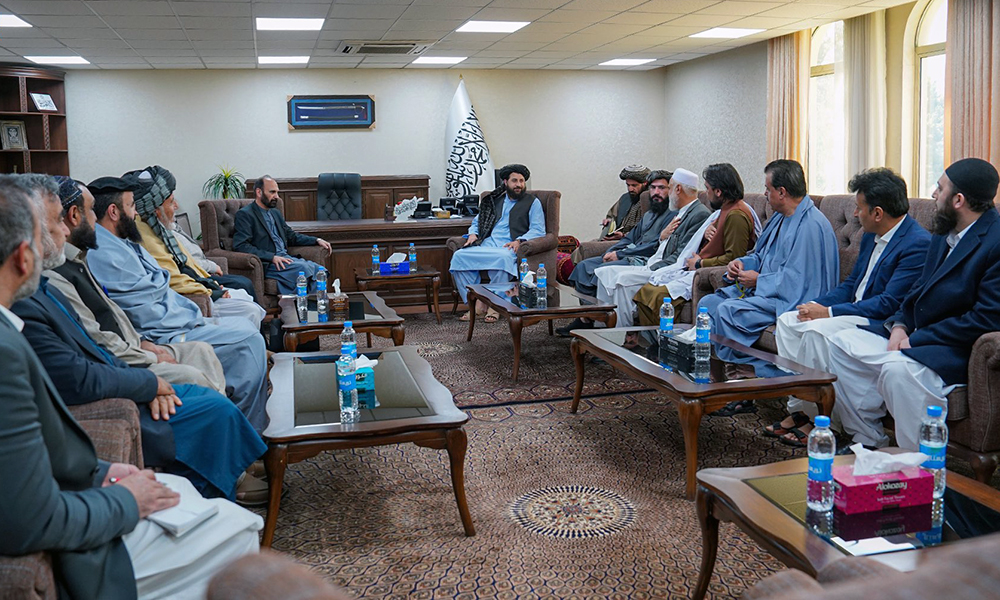
Representatives of the Union of Afghans living in Europe on Tuesday met with the ministers of defense and mining for talks on several issues.
Acting Minister of National Defense Mohammad Yaqoub Mujahid said in a meeting with union delegates that the current security situation in the country has provided an opportunity for everyone to participate in the progress of Afghanistan.
Mujahid added that there were still some problems in certain areas but that these will be removed.
In this meeting, Mujahid called Afghanistan the common home of all Afghans and said the problems in the country will be solved soon.
“The problems that exist in some issues will be solved soon; but there was nothing more than the security that has been revealed in this land today with the help of Allah and with the sacrifices of our people,” he was quoted in a statement as saying.
According to the statement, a number of Afghans, who only moved to the country after the Islamic Emirate’s takeover, expressed their satisfaction with the current situation in the country.
In addition, Shahabuddin Delawar, acting Minister of Mines and Petroleum, also met with union representatives and asked Afghans living abroad to return to Afghanistan and contribute to the country’s progress.
In this meeting, the Afghans living in Europe asked Delawar to provide better facilities to Afghans who want to invest in the country. The Ministry of Mines and Petroleum says that Delawar also asked the visiting delegation to return to Afghanistan and contribute to the country’s development.
Earlier, in a meeting with a number of other officials of the Islamic Emirate, including the political deputy of the Prime Minister and the Acting Minister of Foreign Affairs, this delegation emphasized the need to strengthen the system and provide work and education to Afghan girls and women.
Latest News
Regional developments require Afghanistan, China’s full coordination to protect interests: Muttaqi
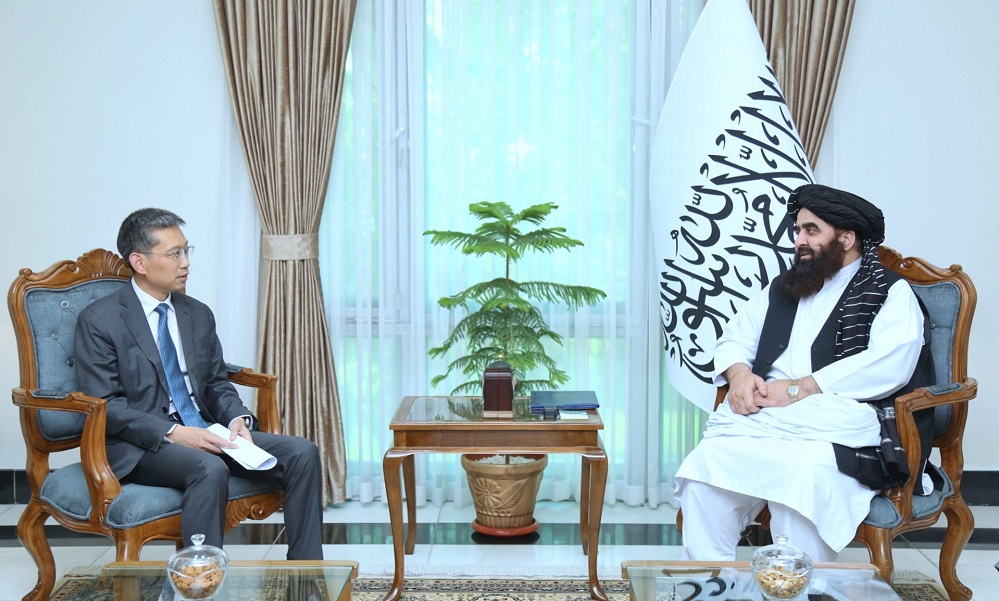
Acting Minister of Foreign Affairs Amir Khan Muttaqi has said that recent events and developments in the region require that Afghanistan and China continue their cooperation in full coordination so that they can protect their common interests.
Muttaqi stated this in a meeting with the Chinese ambassador in Kabul Zhao Xing.
The Ministry of Foreign Affairs said in a statement Tuesday that the two sides discussed bilateral political, economic and cultural cooperation between Afghanistan and China and the recent developments in the region.
Muttaqi expressed his satisfaction with the expansion of political, economic and cultural relations between the two countries and said that the Islamic Emirate has created good opportunities in the field of trade and investment.
He pointed out that the increase in the export of pine nuts to China and the progress in the Mes Aynak and Wakhan Corridor projects are clear examples of this policy of the Islamic Emirate.
According to the Ministry of Foreign Affairs’ statement, the Chinese ambassador considered the developments in various fields with Afghanistan as positive and added that he seeks to encourage Chinese businessmen and investors to play their role for long-term economic cooperation with Afghanistan.
He also said that his country is considering ways of bilateral cooperation and resources regarding Wakhan Corridor.
Latest News
Rashid Khan named AWCC’s brand ambassador
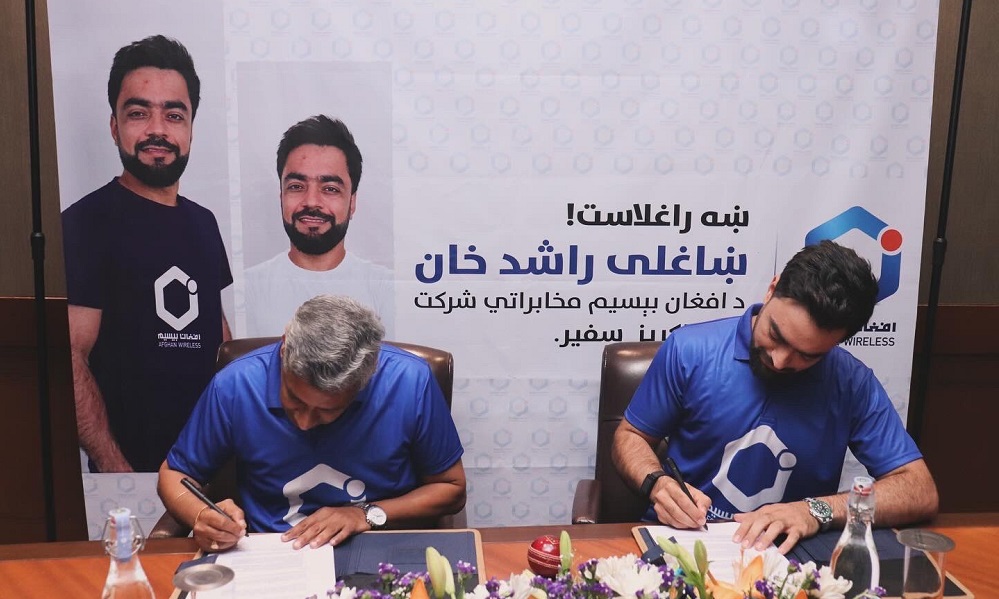
Afghanistan’s cricket superstar Rashid Khan has joined Afghan Wireless Communication Company (AWCC) as its exclusive brand ambassador.
“Rashid Khan is a young and prominent personality of the country who has shone brilliantly in cricket and in his social life,” AWCC said in a statement.
Rashid said he was thrilled to join AWCC as its brand ambassador.
“This is a great brand that I have always believed in and AWCC has been a front runner in the digital possibilities materializing in the country,” Khan said on X.
“Together I hope that we help more people to connect, encourage people to learn more and further utilize their talents and share their experiences more widely.”
What makes Rashid great!
Rashid Khan was Afghanistan’s first global superstar, and the key to the team’s successes in their early years in international cricket.
ESPNcricinfo experts say his extraordinarily effective leg spin has made him one of the greatest T20 bowlers ever, and among the first names on wish lists of teams in leagues all around the world.
Not a big turner of the ball, he puts batters under pressure with his speed through the air, like his bowling idol Shahid Afridi, while maintaining a stump-to-stump line. His biggest weapon is an accurate googly, and he has many variations. With bat in hand he is more than capable of clearing the boundary late in an innings, and he has airbrushed many a middling total into a match-winning one for his team, ESPNcricinfo states.
Rashid was just 17 when he made his ODI debut during Afghanistan’s tour of Zimbabwe in October 2015. Less than two years later, he was snapped up by Sunrisers Hyderabad in the IPL for close to US$600,000.
After a superb 17-wicket first season with them, he picked up franchise deals with Guyana Amazon Warriors – for whom he took the first-ever hat-trick in the CPL in 2017 – and Adelaide Strikers, with whom he won his (and their) first BBL title in 2018.
He scaled new heights for Afghanistan as well, taking 5 for 3 in a T20I against Ireland to keep a record 11-match T20I winning streak alive, and later in 2017, taking his country to a win over West Indies in their first ODI in the Caribbean with 7 for 18.
He was duly honored as the 2017 ICC Associate Cricketer of the Year.
The following year, he became the youngest cricketer to top the ODI bowling rankings, the youngest man to captain an international side, and the fastest to 100 ODI wickets.
In Afghanistan’s inaugural year in Test cricket, Rashid took five second-innings wickets in the team’s first win, against Ireland, and six months later made an important fifty and took twin five-fors, finishing with 11 wickets in a famous win over Bangladesh in Chattogram. In 2021, he took 11 again, this time in a win over Zimbabwe.
In his five seasons with Sunrisers, he was a huge presence, taking 93 wickets at an economy rate of 6.33. When he moved to Gujarat Titans in 2022, he took 19 wickets in a run that led the side to the title.
-

 Business4 days ago
Business4 days agoCommerce ministry inks 10 MoUs to boost development of small and medium-sized businesses
-

 Sport4 days ago
Sport4 days agoRashid Khan threatens BBL pullout after Australia postpones Afghanistan T20I series
-

 Latest News4 days ago
Latest News4 days agoOver 6,000 acres of land cleared of poppies in Badakhshan
-

 Health5 days ago
Health5 days agoBalkh health officials report sharp increase in number of cancer patients
-

 Latest News4 days ago
Latest News4 days agoMSF ‘deeply concerned’ over new phase of deportations of Afghans from Pakistan
-

 Sport3 days ago
Sport3 days agoAfghanistan Champions League kicks off with grand opening ceremony
-

 Latest News2 days ago
Latest News2 days agoPakistan’s frontiers minister stresses ‘dignified’ return of Afghan refugees
-

 Regional4 days ago
Regional4 days agoIran’s foreign minister downplays drone attack, says Tehran investigating


